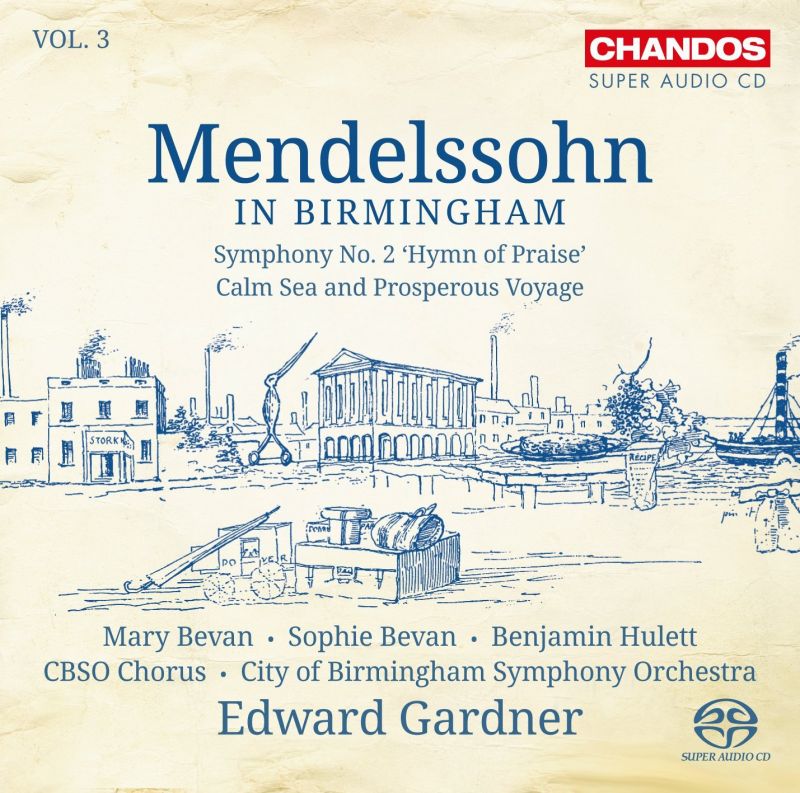MENDELSSOHN Symphony No 2
View record and artist detailsRecord and Artist Details
Composer or Director: Felix Mendelssohn
Genre:
Orchestral
Label: Chandos
Magazine Review Date: 04/2015
Media Format: Super Audio CD
Media Runtime: 134
Mastering:
DDD
Catalogue Number: CHSA5151

Tracks:
| Composition | Artist Credit |
|---|---|
| Symphony No. 2, 'Hymn of Praise' |
Felix Mendelssohn, Composer
Benjamin Hulett, Tenor City of Birmingham Symphony Chorus City of Birmingham Symphony Orchestra Edward Gardner, Conductor Felix Mendelssohn, Composer Mary Bevan, Soprano Sophie Bevan, Soprano |
| Meeresstille und glückliche Fahrt, 'Calm Sea and Prosperous Voyage' |
Felix Mendelssohn, Composer
City of Birmingham Symphony Orchestra Edward Gardner, Conductor Felix Mendelssohn, Composer |
Author: Rob Cowan
Back in Mendelssohn’s day the Second Symphony enjoyed great success in Birmingham, to the extent that the finale’s Lutheran chorale ‘Nun danket alle Gott’ (‘Let all men praise the Lord’, as here) brought the audience to its feet. The problem with Mendelssohn’s Second Symphony (in reality his Fourth) is that in the wrong hands it can sound portentous; but here, because textures are kept transparent, overall dynamics relatively low-key – at least in the first three movements – and the tempos are constantly mobile, it sheds its Victorian drapery and becomes precisely what it is, an airborne ‘hymn of praise’. The anticipatory three-movement Sinfonia that has led so many to liken the work to Beethoven’s Ninth acts as a preparation for the great choral exclamation ‘All men, all things, all that has life and breath, sing to the Lord, Hallelujah…’, one of the most exhilarating moments in all of Mendelssohn, very well sung here though not especially exultant.
Turn to Thomas Fey with the Deutsche Kammerchor and the Heidelberg Symphony Orchestra, and the moment is marked with a greater sense of occasion though, come ‘Nun danket alle Gott’, Fey’s tempo is virtually half that chosen by Gardner. Jan Willem de Vriend’s recording also keeps to a low calorie count while holding fast the sense of awe that was surely part of Mendelssohn’s prompting inspiration. Mention should also be made of the Kammerchor Stuttgart and Deutsche Kammerphilharmonie Bremen under Frieder Bernius.
Gardner stresses what over the years we have come to consider the more purely Mendelssohnian attributes, Apollonian qualities such as lightness, line and overall beauty of form, hence the fact he holds the finale’s various sections together with great skill: there are no unseemly bumps as one leads to another and his vocal team is excellent, the sisters Mary and Sophie Bevan especially, not to mention the excellent chorus. Superb sound, too, the best place to sample being the thrilling seventh number of the finale, ‘The night is departing’, with its very audible organ. A fine production all round, certainly if you want the work sung in English, though for me Fey and de Vriend, whose versions are also in excellent sound, just about pip Gardner to the post, principally because of their marginally higher levels of engagement. Remember though that first-rate fill-up, almost worth the price of the disc alone.
Discover the world's largest classical music catalogue with Presto Music.

Gramophone Digital Club
- Digital Edition
- Digital Archive
- Reviews Database
- Full website access
From £8.75 / month
Subscribe
Gramophone Full Club
- Print Edition
- Digital Edition
- Digital Archive
- Reviews Database
- Full website access
From £11.00 / month
Subscribe
If you are a library, university or other organisation that would be interested in an institutional subscription to Gramophone please click here for further information.




